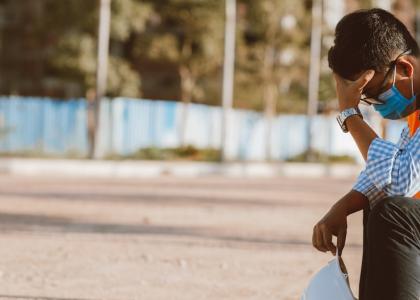Longitudinal Cohort
Defining Trajectories of Linguistic, Cognitive-Communicative and Quality of Life Outcomes in Aphasia

This project aims to examine the effect of COVID-19 on telerehabilitation access and the cognitive-communicative and psychosocial health outcomes for patients with aphasia.
COVID-19 Pandemic Mitigation, Community Economic and Social Vulnerability, and Opioid Use Disorder

The goal of this study is to leverage large comprehensive claims and electronic health data, capturing nearly half of the U.S. population from before the pandemic through 2026, to test our hypothesis that social and economic vulnerabilities, as well as economic side effects of the pandemic will escalate the prevalence of OUD and related harms.
Statistical Adjustments of Sample Representation in Community-level Estimates of COVID-19 Transmission and Immunity

This project will develop a valid metric to estimate the true viral incidence and immunity prevalence in the community, examine the health disparities and social inequality, and monitor the epidemic over time as an operational surveillance system.
Rural-Urban Disparities In Spillover Effects of COVID-19

This project is focused on understanding the magnitude of COVID’s spillover effects on cerebrovascular disease in rural areas, as well as the impact of key mitigation strategies.
A National Neighborhood Data Resource to Understand Inequities in the Health and Socioeconomic Impacts of COVID-19 in the United States

This project will use the National Neighborhood Data Archive (NaNDA) to identify which communities are most vulnerable to the immediate and longer-term consequences of the pandemic for a host of behavioral, psychological, social, and economic outcomes.
Policies on Racial/Ethnic and Socioeconomic Disparities in Mental Health and Healthcare Utilization

The goal of this study is to leverage, expand upon, and link existing national data sets to test the hypothesis that county-level public health and social policies have affected disparities in mental health and healthcare utilization.
Impact of the COVID-19 Pandemic on Patients with Alzheimer's Disease and Alzheimer's Disease Related Dementias

In this project, we will examine the impact of changes in outpatient and inpatient care on clinical event rates and deaths among older patients with Alzheimer’s Disease and Alzheimer’s Disease Related Dementias living in the community.
A New Database to Measure the Association Between Income, Race, and Mortality: Inequality in Longevity During and Beyond the COVID-19 Pandemic Disparities

This project will build a public database of mortality rates incorporating socioeconomic and demographic variables across the U.S. population. Researchers will be able to analyze the sources of disparate impacts of COVID-19 on mortality across subgroups, with the aim of understanding how to reduce health inequality.
CV Wizard: Does a Prioritized, Point-of-Care Clinical Decision Support Tool Improve Guideline-Based CVD Risk Factor Control in Safety Net Clinics?

This project will assess virtual care's impact on cardiovascular disease risk management in community health centers and the role of patient-facing clinical decision support tools during the pandemic. Specifically, it investigates how the shift to virtual care (VC) affects cardiovascular disease (CVD) risk management; the shift’s impact on existing health disparities in vulnerable populations; and whether CVD care in VC can be enhanced by the use of patient-centered clinical decision support tools.
Safe and Just Cleaners: Reducing Exposure to Toxic Cleaning Chemical Products Among Low Wage Immigrant Latino Community Members

This project will assess the impact of the COVID-19 pandemic on the health and well-being, employment status, and cleaning and disinfecting practices among Latinx domestic cleaners in the NYC metropolitan. It will then develop educational materials for a COVID-19 Domestic Cleaner Safe Return to Work Toolkit for domestic cleaners and clients based on survey findings.